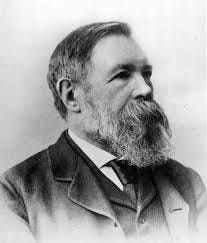
Friedrich Engels was a German philosopher and writer who is best known for his work with Karl Marx in writing the Communist Manifesto. Friedrich was a critic of capitalism, as he witnessed first-hand the effects that the economic system had on working class people, as he was born into a wealthy business owning family. What Friedrich had witnessed while growing up would go on to shape is socioeconomic views, and would influence political movements for over a century, and even in the modern period of political thought.
Early Years:
Friedrich was born into a wealthy German business owning family in what was then known as Prussia. His father owned various textile mills throughout various places in Europe, and would end up working in one of his father’s factories that was located in Manchester, England. After working in his father’s factory , Engels witnessed events that would go on to shape his criticisms on capitalism, and lead to his shifts in belief on the necessity of a new economic system. Throughout his writings, Friedrich described the overcrowdedness of various towns throughout Manchester, the dangerous living conditions that working people faced, such as unsanitary roads and the constant threat of diseases, and unsafe working conditions, such as people having to work over 12 hours a day just to make ends meet. All of these events that he witnessed would lead to Engels adopting the views of both socialism and communism.
So, what exactly is socialism and communism?
Before going on about Friedrich’s work, it is important to describe what exactly socialism and communism are, as there have been various misconceptions about their intentions and how they exactly work. We have seen the words “socialist”, “Marxist”, “communist” be hurled as insults towards political candidates in order for politicians to fearmonger to their respective political bases in order to rile them up and have them see other political candidates as radical, and label their views as unpopular to the public. But, lets define what exactly these terms are. Lets begin with socialism. The primary goal of socialism is to put the means of production in the working class (proletariat) instead of the business owners (bourgeoisie) . In theory, it is supposed to allow the working class to have more of a grip on social and economic power, rather than just the top owners. It also seeks to reduce wealth inequality as well, and calls for privately owned property of the bourgeoisie to be used for the public.
What about Communism?
Without getting to deep into political and economic theory for the sake of the length of this post, the main goal of communism is to achieve a classless society, which is a society where there is no such thing as wealth inequality, and the means of production are put into the hands of those who need it in order to survive, rather than just doing it for the sake of lining up the pockets of business owners. Socialism is seen as a transitional period to full on communism, which was described by Karl Marx, Friedrich’s collaborator.
Engel’s View on Democracy and Socialism
While many might view Engel’s stance on socialism as outside of the scope of popularity, both he and Marx saw democracy and its ideals as a means to achieve the society that they wanted, but to a certain extent. Engels believed that the working class being able to mobilize and come together in order to combat wealth inequality was a necessary step in order to achieve the kind of society he wanted, which reflects democratic views in how it demonstrates people using their voices and willingness to stay informed in order to have a say in how they want their government to operate. Engels also argued that having a democracy that actually works and serves the people could be used in order to achieve a socialist society. In his own writings and his writings with Marx, they both argued that democratic ideals could be used as a means in order combat the influence that the wealthy had in the respective political climate.
Wait—So Engels was a Fan of Democracy?
Not necessarily. Engels was still a critic of the democratic institutions in place in Europe that allowed for the wealth gap between the proletariat and the bourgeoisie to continue to increase, and argued that democratic capitalism is unjust, and allowed for the top earners to have more of a say in how their governments should operate. However, Engels was not objected to democratic ideals altogether. He saw it as a means to an end, and believed that democratic ideals could be used as a foundation in order to transition into a system with little wealth disparity (socialism) and eventually, to a society that is classless, with absolutely no wealth inequality at all, and completely abolished the private property of the wealthiest of owners (communism).
Sources:
https://monthlyreview.org/2020/05/01/engels-vs-marx-two-hundred-years-of-frederick-engels/
https://www.britannica.com/money/Friedrich-Engels
https://www.marxists.org/archive/lenin/works/1917/staterev/ch04.htm
https://www.tandfonline.com/doi/full/10.1080/03017605.2011.537451#d1e160


